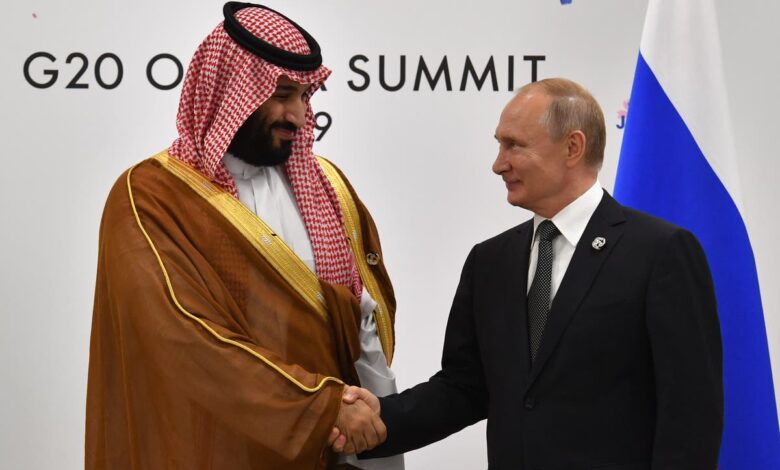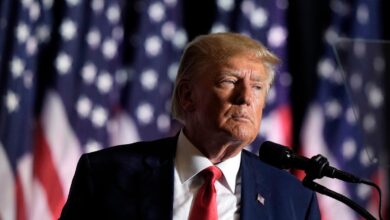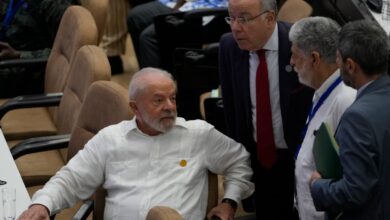Moscow rules: Why the west’s Middle East partners choose Putin over principle in Ukraine war

For decades the west has wined and dined the oil-rich autocrats of the Arabian Peninsula, welcoming them to purchase football clubs and even win access to their political elite while selling them advanced weapons and buying up their gas and oil.
But at a crucial juncture in European history, with Russia attacking Ukraine and threatening the entire post-World War II security order, the Gulfies are nowhere to be found.
The west has been unable to count on the United Arab Emirates’ vote at the UN to condemn the invasion; and during Thursday’s vote to remove Moscow from the UN’s Human Rights Council after its alleged war crimes in Ukraine, all of the Gulf states abstained.
The west has been unable to get them to ramp up oil and gas production, to stave off the effects of removing Russian energy from the markets. It has been unable to convince them to abide by sanctions, or even bar Russian oligarchs close to Vladimir Putin from parking their cash and yachts in the Gulf’s glittery cities.
US president Joe Biden has been unable even to get the leadership of Saudi Arabia or the UAE on the phone, according to news reports.
“There seems to be this hubris in Washington that Saudi Arabia and UAE are proxies or allies or partners,” said Andreas Krieg, a Persian Gulf specialist at King’s College London. “But what the US is waking up to is a reality in which Saudi and the UAE are playing their own game.”
In part, many in the Middle East shrug off the images of fleeing families, bombed-out cities and butchered civilians. In contrast to Europe, they have been living with such brutality in their region for decades, including in Iraq, Syria and Yemen.
But their ambivalence toward the tough western stance on Russia’s invasion of Ukraine also underscores the Kremlin’s success in building Middle East inroads over the last decade. Moscow has an especially close relationship with the UAE, and the two countries find themselves partnered in overseas gambits across Africa and the Middle East. Meanwhile, the US is vocally and actively seeking to disengage from the Middle East.
“The relationship is really strained and fractured under some recent policy shifts under Biden and under previous administration,” said Adam Lammon, a Middle East fellow at the Center for the National Interest, a Washington think tank, and executive editor of The National Interest.
“The perception is that the US is sort of shifting away from their security concerns. They’re feeling the relationship isn’t the way it used to be and they’re seeing it as a trend rather than a series of one-off decisions.”
The ties between Russia and the Gulf are deeper than many in Washington imagine. The UAE allegedly hired the shadowy Kremlin-linked Wagner Group of mercenaries to conduct combat operations in support of warlord Khalifa Haftar in Libya, a relationship that suggests far-reaching security cooperation at the highest echelons.
Russian Chechen warlord Ramzan Kadyrov, who allegedly keeps a $7 million villa in Dubai, has been providing military training and muscle for the UAE’s armed forces and has served as a Kremlin envoy to the autocratic regimes of the Muslim world.
The UAE has invested millions in Chechnya development projects, including the massive Grozny Mall and 100-floor luxury Akhmat Tower. During a 2018 visit, Mr Kadyrov and UAE’s de facto ruler Crown Prince Mohammed bin Zayed were photographed embracing affectionately.
“The very authoritarian verson of Islam touted by both Checnhya and UAE draws them close together,” Mr Krieg told The Independent.
In a leaked diplomatic cable that was later rescinded, the US State Department urged diplomats to consider the UAE along with India as “in Russia’s camp” with regard to the Ukraine conflict, after both countries abstained on a UN Security Council vote to condemn the Kremlin’s war.
Lana Zaki Nusseibeh, Permanent Representative of United Arab Emirates to the UN, speaks at the UN Security Council in New York, 11 March 2022
“Continuing to call for dialogue, as you have been doing in the Security Council, is not a stance of neutrality; it places you in Russia’s camp, the aggressor in this conflict,” said the note, which was obtained by the news website Axios.
The UAE defended its votes at the Security Council by insisting that “taking sides would only lead to more violence.”
Both the UAE and Saudi value their Western ties, and both welcomed UK Prime Minister Boris Johnson when he visited in mid-March.
But Abu Dhabi’s leadership likely feels that it can get away with a large degree of straying from the American line after signing the US-sponsored Abraham Accords, which normalised its relations with Israel and won it plaudits from pro-Israeli lawmakers in Washington.
Russia long term is the more sustainable partnership than the US
File photo: A general view of Saudi Aramco’s Abqaiq oil processing plant, 20 September 2019





